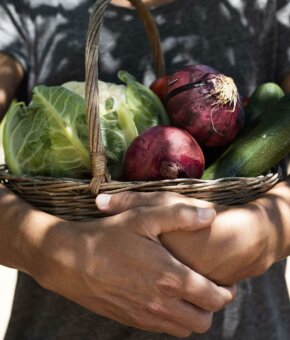
Roughly a third of the world’s food is never eaten, making land, energy and resources used in producing it unnecessary. Luckily, the tide is turning. These initiatives show that cities without food waste are no utopian dream, but a realistic vision for the future.
The 923 million tonnes of food being wasted each year could fill 23 million 40-ton trucks. Bumper-to-bumper, enough to circle the Earth seven times. Add to that all the unnecessary deforestation that took place to create room for agriculture and you understand why, according to To enable cities, policymakers, corporations, investors, communities and engaged citizens to push the right ‘green’ buttons, non-profit organization Project Drawdown compiled a top 100 of the most effective climate solutions. The mission? Reaching point Drawdown - the point where the levels of greenhouse gases in the atmosphere start to steadily decline - as quickly, safely and equitably as possible. Find out more: https://sustainableurbandelta.com/climate-solutions-project-drawdown/ , reducing food waste is the most effective way to combat climate change.
By bringing sustainable food production back to cities, we can close the gap between farm and fork and reduce spillage that occurs along the way. In addition, by reconnecting people to the source of their food, they see how much time, love and energy it takes to produce food, and are thereby less likely to waste it.
Although food waste is a major issue, solutions are being created and implemented in cities everywhere as we speak:
1) Giving everyone access to fresh produce
In most communities, food waste and food poverty coexist. By sharing abundance and putting a stop to unnecessary waste, non-profit Food Forward is tackling both issues in and around Los Angeles. The organization collects fresh produce that otherwise goes to waste from farmers markets, wholesale food suppliers, and even residential backyards, to subsequently donate it to community members who need it the most.
2) Reallocating food in Singapore
Sometimes being part of the solution for a major problem can be as simple as downloading an app. By connecting businesses and hotels who have surplus food to everyday consumers, Treatsure in Singapore is preventing food waste whilst enabling people to buy great food at a discounted rate. A win-win for everyone, including the planet.
3) This cooperative is helping Portugal to embrace ‘ugly fruit’
Due to aesthetic standards that have nothing to do with food safety, fruits and vegetables are wasted every single day. In order to turn the tide, Fruta Feia – Portuguese for ‘ugly fruit’ – is enabling city dwellers to embrace fresh ‘imperfect’ goods. Every week, the cooperative visits local producers and farms to purchase the small, big or misshaped fruit and vegetables they cannot sell. Fruta Feia turns ‘their harvest’ into food boxes, which are sold to consumers in Lisbon, Porto and other cities throughout the country.
4) A solar-powered solution for food waste in Nigeria
As temperatures on Nigerian markets soar, fresh produce spoils fast. Throughout the day, food can sell at less than half of its original value, slashing profits for farmers and creating a mountain of food waste. With their solar-powered food storage units designed for markets and farmers, ColdHubs offers an innovative solution.
5) Making zero waste cities the new norm
The average restaurant or catering business produces kilos of orange peels, coffee grounds and other residual flows on a daily basis. What if we did not throw all these materials into the same green bin, but collected them separately and turned them into new products locally? So that restaurants can polish their kitchens with cleaning products made from their own orange peels and serve coffee in cups of their own coffee grounds? That is exactly what Anja Cheriakova is realizing with De Clique. “There is so much value in things that are now labeled as waste. All kinds of residual flows are incinerated that you could feed people with. Or things you could use as building materials. The more you dive into this, the more you realize we can create local economies that run on residual flows.”
Interested to learn more about pioneers who revolutionize the food system? This 1,000 m2 urban rooftop farm shows the sky is the limit.



